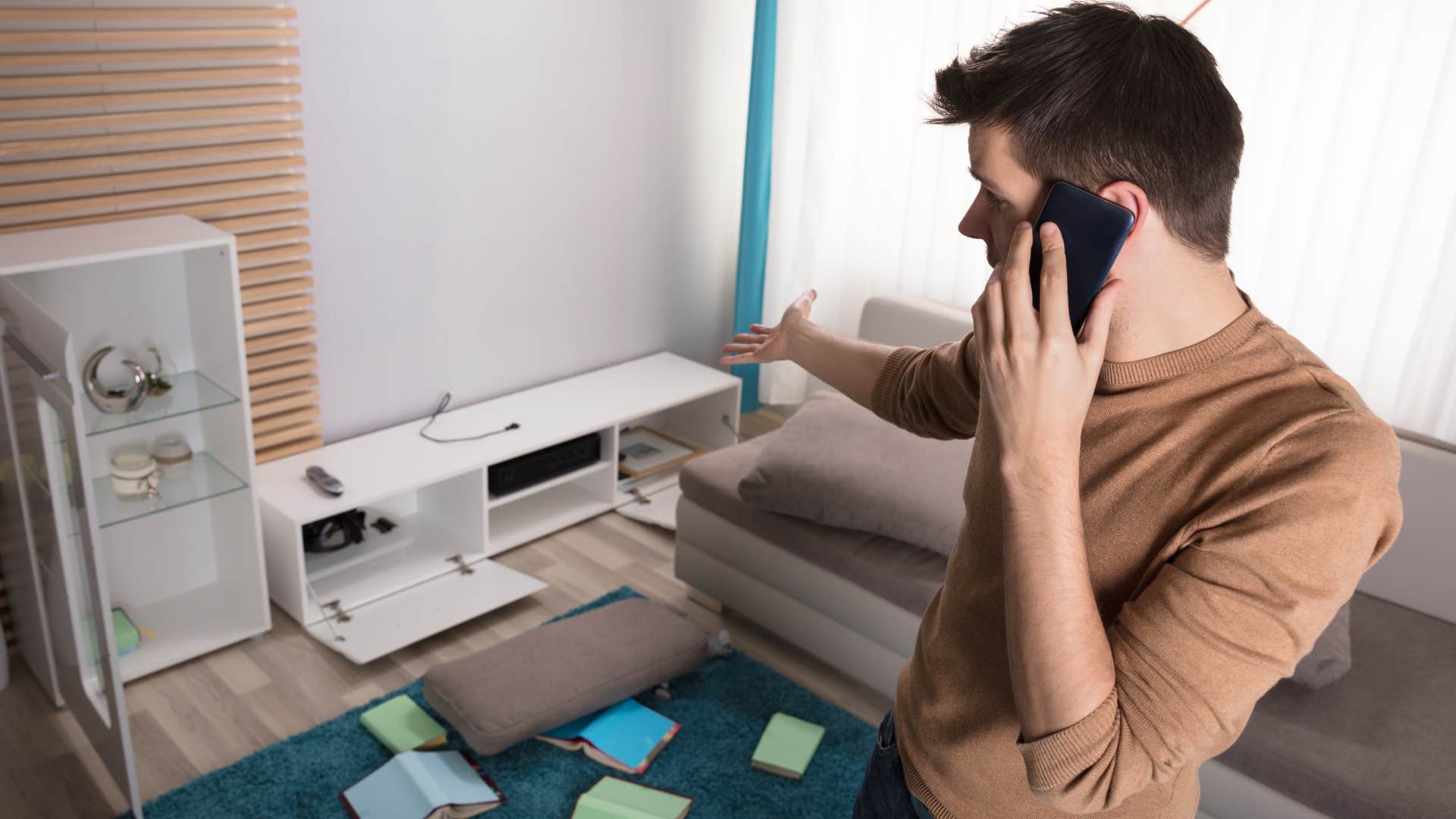If Someone’s Embarrassed About Their House, They’ll Say These 11 Phrases When You Ask To Come Over
Some people feel ashamed of the place they call home.
 sav_an_dreas | Shutterstock
sav_an_dreas | Shutterstock More than 80% of people regularly feel embarrassed by the state of their home, according to a report by Moneywise, whether it's due to cleanliness, size, or overall style. For some, it’s a financial challenge — they lack the money or disposable income to make their homes match their inside vision or personality. For others, it’s a matter of time and stress — they spend too much time at work, caring for family, or juggling responsibilities, so their home, where they rest and unwind, becomes the least of their concerns.
Even if dealing with this embarrassment is a relatively internal experience, if someone’s embarrassed about their house, they’ll say these phrases when you ask them to come over. Whether it’s avoidance or a defense mechanism, they always try to overcompensate for the state of their living space in some way.
If someone’s embarrassed about their house, they’ll say these 11 phrases when you ask to come over:
1. ‘Do you mind if we go to your place?’
 GaudiLab | Shutterstock.com
GaudiLab | Shutterstock.com
Many people experiencing “house shame” and embarrassment about their living spaces find it hard to connect with others at home. They often prefer visiting someone else’s place or use expressions like this to avoid hosting when someone asks to come over.
Especially during this particular time in the world, house shame is amplified. "The videos being created on social media platforms are filmed from areas like living rooms, bedrooms, or backyards, so we get a glimpse of how aesthetically pleasing they are compared to ours," says marketing expert Andrea Chapman. "And because we've been working and studying from home [more]… we're more conscious than ever of the way our home looks and how it doesn't look anything like those videos."
So, even if embarrassment or self-consciousness about your space has never been an issue, the rise of social media and the time you spend at home might influence how often you ask questions like “Do you mind if we go to your place?”
2. ‘It’s not a great time right now’
 Fizkes | Shutterstock.com
Fizkes | Shutterstock.com
By delaying plans with people or opting for a third-party location, someone who is embarrassed about their house can manage their stress about having guests over. Even if they never actually get around to cleaning after a long day or meeting with friends, they’ll keep saying things like “it’s not a great time right now” to postpone cleaning routines.
For some, it’s not even a matter of cleanliness, but other things like location, space, decorations, or housemates. They feel embarrassed about things they can’t control — and often, things that the guest will never notice, understand, or care about.
3. ‘I’m not ready for guests’
 PeopleImages | Shutterstock.com
PeopleImages | Shutterstock.com
If you've hosted a party or even just had a few friends over, you know what Guest Stress Syndrome (“GSS”) is. From spiraling into the “my house has to be perfect” mindset to feeling panicked about entertaining, or even mourning the loss of solitude and alone time, hosting people is more complicated than it appears for the person asking to come over.
Of course, nobody is really paying as much attention to things like floorboards or dust as we think, but many still feel embarrassed when others enter their private space. That’s why phrases like “I’m not ready for guests” or “come by another time” are so common — people are trying to hide what they see as dirt in their home and give themselves time to clean.
4. ‘It’s kind of a disaster right now’
 we.bond.creations | Shutterstock.com
we.bond.creations | Shutterstock.com
According to a study by Talker Research for BISSELL, a quarter of Americans believe that keeping their house clean and clutter-free is more difficult than their actual full-time job — whether that’s a corporate position or raising kids as a stay-at-home parent. Of course, that’s a surface-level kind of clean, not even the more thorough, intentional chores like washing floorboards or moving furniture.
So, if you hear a phrase like “it’s kind of a disaster right now” when you ask to come over to someone’s home, chances are it’s not a self-discipline problem — although they’re probably embarrassed all the same.
5. ‘I swear it doesn’t normally look like this’
 Anatoliy Karlyuk | Shutterstock.com
Anatoliy Karlyuk | Shutterstock.com
According to another Talker Research and Swiffer study, one in nine people admit that their home isn’t currently “up to their standards” — struggling to keep up with cleaning and maintenance amid the chaos of everyday life. So, even if a phrase like “I swear it doesn’t normally look like this” is an excuse or a defense against embarrassment, it’s largely true in many cases.
Whether it’s clutter, cleanliness, or style during a renovation, many people feel stuck in their current home situation — embarrassed by how they think guests and visitors perceive them.
6. ‘I wasn’t expecting company’
 PR Image Factory | Shutterstock.com
PR Image Factory | Shutterstock.com
By pretending that they “would’ve cleaned” if they’d known someone was coming over — even if, let’s be honest, they might not have — people who feel embarrassed about their house can protect their sense of sanctity and well-being. Ultimately, if someone is embarrassed about their house, these kinds of phrases serve as defense mechanisms against shame.
Especially when comparing oneself to people on social media, shame can seriously harm self-esteem, according to a study from Europe’s Journal of Psychology. So, even if something like the cleanliness of your home or the stylishness of your space seems innocent and subtle, they can influence how a person feels about themselves and the confidence they carry in daily life.
7. ‘We aren’t staying here long’
 Rawpixel.com | Shutterstock.com
Rawpixel.com | Shutterstock.com
By implying that their current space is temporary, people who feel embarrassed by their homes can shield themselves from perceived judgments about their character and criticism. They use phrases like “we aren’t staying here long” to dissociate their identity, personhood, and character from their home.
Of course, only superficial or insecure people will judge your character based on the size, condition, or even cleanliness of your home, so it at least helps to filter out the people who aren’t meant to be in your life.
8. ‘It’s a bit too cramped for guests’
 Bogdan Cherniak | Shutterstock.com
Bogdan Cherniak | Shutterstock.com
According to a study from the Journal of Happiness Studies, the size of a person’s living space signals — or at least, is perceived to signal — status. In some cases, the size of a person’s home can even impact their mental health and overall well-being. So, a phrase like “It’s too cramped” or “It’s not big enough for all of us” may seem like a surface-level sign of embarrassment, but it’s often rooted in bigger, more nuanced ideas.
Fortunately, how a person feels about their space matters more than its size, according to a study published in the Journal of Environmental Psychology. Whether it’s a sense of personhood and identity or the connection someone has with the people they live with, all of those experiences are more significantly important than the square footage.
9. ‘I’d invite you in, but the kids made a mess’
 Wavebreakmedia | Shutterstock.com
Wavebreakmedia | Shutterstock.com
People who are embarrassed about their house often shift blame to others—whether it’s their kids, the dog, or their roommates—as a way to compensate. Of course, in many cases, that’s true—many parents juggling work, family responsibilities, and childcare can’t keep up with the messes that appear at home.
Since mental health and cleanliness at home are connected, the shame and embarrassment they feel for not having enough time to keep their space clean only become worse and more impactful over time.
10. ‘It’s a work in progress’
 Andrey_Popov | Shutterstock.com
Andrey_Popov | Shutterstock.com
Many people renovating their homes or trying to create a space they enjoy amid financial uncertainty use phrases like “it’s a work in progress” to shield themselves from perceived judgment by guests.
Even if the people they’re having over don’t care about the state of their home, but rather spend quality time with their friends and family, it’s a deeply ingrained habit to feel embarrassed about a living space that doesn’t meet their personal expectations or vision.
11. ‘I’ve been meaning to look for a new place’
 Art_Photo | Shutterstock.com
Art_Photo | Shutterstock.com
By separating their identity from the space they live in, people who feel embarrassed by their homes can protect themselves from judgment of their character. If their home is dirty, small, cramped, or loud, they use phrases like “I’ve been meaning to look for a new place” to align themselves with the guests they perceive as judging.
Of course, the homes we curate and create often reflect who we are, so when our living space feels impersonal or lacks self-expression, it can lead to a disconnect and even cause resentment.
Zayda Slabbekoorn is a senior editorial strategist with a bachelor’s degree in social relations & policy and gender studies who focuses on psychology, relationships, self-help, and human interest stories.

